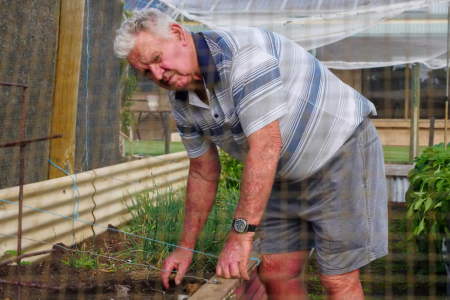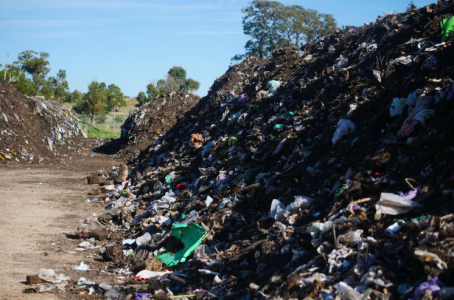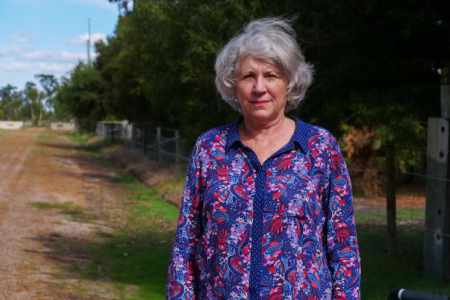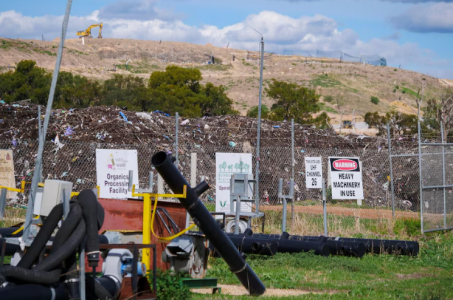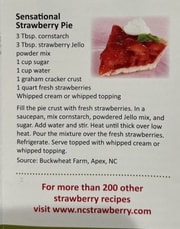PFAS-contaminated compost sold to public, WA environmental regulator confirms
By
ABC News
- Replies 0
Leonard Machen had been filling his home vegetable garden with compost from a council-owned organic waste facility for years when he heard rumours it might be contaminated.
Based in Dardanup, about 180 kilometres south of Perth, Bunbury Harvey Regional Council (BHRC) has been turning kerbside food organics and garden organics (FOGO) waste from more than 40,000 South West households into compost for more than a decade.
It then sells the compost back to residents and donates it to school and community gardens.
The ABC can now confirm samples of the compost tested by the Department of Water and Environmental Regulation (DWER) in May and October last year contained a group of toxic "forever chemicals" called PFAS "above laboratory detection limits".
Mr Machen said the scale of the health risk was unclear but he had started removing the compost from his garden to be safe.
"You can't get any real answers from anyone," he said.
"Are we poisoning our own families with this sort of stuff? I don't know."
The facility stopped selling the compost and ceased all FOGO processing in December.
Local governments have started diverting it to landfill as they explore alternative solutions.
FOGO to blame
Federal guidelines warn PFAS can bioaccumulate in plants and animals with adverse impacts, and some varieties are recognised internationally as being toxic to humans and wildlife.
PFAS chemicals are now almost impossible to avoid — they are in our cookware, clothes and food packaging, even types that claim to be compostable.
Western Sydney University Adjunct professor of chemistry Roy Tasker said the priority was to minimise any chance of consuming it directly.
He said early studies of animals suggested the chemical was associated with increased rates of cancer, bladder issues, immunological issues and reproductive problems.
"There's sufficient evidence to be concerned about PFAS in our bodies," Professor Tasker said.
"If the levels are high enough to be detected, I don't think that compost should be used for growing vegetables or food."
DWER said the FOGO waste was likely contaminated by household waste and plastics mixed up in green bins before it reached the facility.
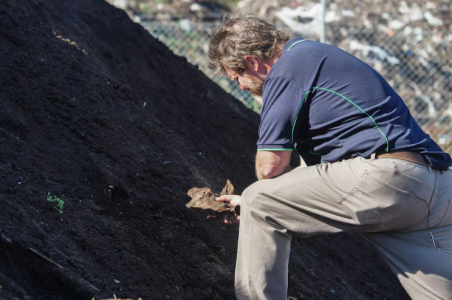
It said concentrations were generally low but any waste containing detectable levels of PFAS was unsuitable for recycling.
However, it declined to comment on whether people should remove the contaminated product from their gardens.
BHRC chief executive Nick Edwards said while the council stopped selling the compost out of caution he did not think it was unsafe.
He said preliminary results of independent testing commissioned by BHRC had not detected PFAS, though he would not share the name of the company conducting the testing.
"It's important the focus is on the results rather than the company that's doing them," he said.
Mr Edwards said he was committed to reopening as soon as possible but it would take a whole-of-community effort.
"If people want to help us with PFAS then I encourage them stick to organic matter. If it hasn't come from a plant or an animal don't put it in your compost bin, that is very important," he said.
The facility has struggled in recent years to manage growing volumes of contaminated waste and is now considering relocating to a new enclosed operation on a neighbouring site.
Mr Edwards said the waste was largely processed manually, then put through an 8-millimetre sieve before being sold.
Mr Machen, who has found several larger items like a plastic toy lion and a roll of sticky tape in the compost, said decontamination measures were clearly falling short.
Residents fear long-term impacts
Jill Cross, a member of the Dardanup Environmental Action Group, said residents were worried by the time PFAS was better understood it would be too late.
"It will be in the dust which will blow onto agricultural land and into Dardanup town site," she said.
"It will blow on people's roofs, into their water tanks."
Ms Cross said she wanted better site regulation and more regular updates on contamination risks.
In 2016, BHRC successfully pushed back on several aspects of DWER's proposed composting standards, including the mandate that organic processing facilities be enclosed to prevent the spread of pollutants and minimise methane emissions.
In 2023, it was found in breach of safe composting standards, posing a contamination risk to surrounding waterways.
When asked if BHRC had since complied with required changes, DWER said it could not comment as the council was the subject of an "ongoing investigation".
Mr Edwards told the ABC the facility met some but not all of the requirements by the deadline and was working with DWER on the remainder.
Meanwhile, Professor Tasker called for stronger national regulations to prevent the use of PFAS in any products in the first place.
Written by ABC South West WA, ABC News.
Based in Dardanup, about 180 kilometres south of Perth, Bunbury Harvey Regional Council (BHRC) has been turning kerbside food organics and garden organics (FOGO) waste from more than 40,000 South West households into compost for more than a decade.
It then sells the compost back to residents and donates it to school and community gardens.
The ABC can now confirm samples of the compost tested by the Department of Water and Environmental Regulation (DWER) in May and October last year contained a group of toxic "forever chemicals" called PFAS "above laboratory detection limits".
Mr Machen said the scale of the health risk was unclear but he had started removing the compost from his garden to be safe.
"You can't get any real answers from anyone," he said.
"Are we poisoning our own families with this sort of stuff? I don't know."
The facility stopped selling the compost and ceased all FOGO processing in December.
Local governments have started diverting it to landfill as they explore alternative solutions.
FOGO to blame
Federal guidelines warn PFAS can bioaccumulate in plants and animals with adverse impacts, and some varieties are recognised internationally as being toxic to humans and wildlife.
PFAS chemicals are now almost impossible to avoid — they are in our cookware, clothes and food packaging, even types that claim to be compostable.
Western Sydney University Adjunct professor of chemistry Roy Tasker said the priority was to minimise any chance of consuming it directly.
He said early studies of animals suggested the chemical was associated with increased rates of cancer, bladder issues, immunological issues and reproductive problems.
"There's sufficient evidence to be concerned about PFAS in our bodies," Professor Tasker said.
"If the levels are high enough to be detected, I don't think that compost should be used for growing vegetables or food."
DWER said the FOGO waste was likely contaminated by household waste and plastics mixed up in green bins before it reached the facility.

Nick Edwards says it's unusual to find larger bits of waste like this in the sifted compost pile. (ABC South West WA: Ella Loneragan)
However, it declined to comment on whether people should remove the contaminated product from their gardens.
BHRC chief executive Nick Edwards said while the council stopped selling the compost out of caution he did not think it was unsafe.
He said preliminary results of independent testing commissioned by BHRC had not detected PFAS, though he would not share the name of the company conducting the testing.
"It's important the focus is on the results rather than the company that's doing them," he said.
Mr Edwards said he was committed to reopening as soon as possible but it would take a whole-of-community effort.
"If people want to help us with PFAS then I encourage them stick to organic matter. If it hasn't come from a plant or an animal don't put it in your compost bin, that is very important," he said.
The facility has struggled in recent years to manage growing volumes of contaminated waste and is now considering relocating to a new enclosed operation on a neighbouring site.
Mr Edwards said the waste was largely processed manually, then put through an 8-millimetre sieve before being sold.
Mr Machen, who has found several larger items like a plastic toy lion and a roll of sticky tape in the compost, said decontamination measures were clearly falling short.
Residents fear long-term impacts
Jill Cross, a member of the Dardanup Environmental Action Group, said residents were worried by the time PFAS was better understood it would be too late.
"It will be in the dust which will blow onto agricultural land and into Dardanup town site," she said.
"It will blow on people's roofs, into their water tanks."
Ms Cross said she wanted better site regulation and more regular updates on contamination risks.
In 2016, BHRC successfully pushed back on several aspects of DWER's proposed composting standards, including the mandate that organic processing facilities be enclosed to prevent the spread of pollutants and minimise methane emissions.
In 2023, it was found in breach of safe composting standards, posing a contamination risk to surrounding waterways.
When asked if BHRC had since complied with required changes, DWER said it could not comment as the council was the subject of an "ongoing investigation".
Mr Edwards told the ABC the facility met some but not all of the requirements by the deadline and was working with DWER on the remainder.
Meanwhile, Professor Tasker called for stronger national regulations to prevent the use of PFAS in any products in the first place.
Written by ABC South West WA, ABC News.

